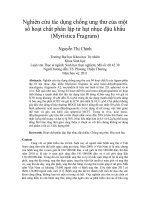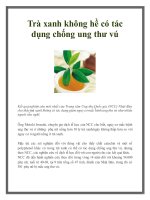Công dụng chống ung thư của cải bắp xanh pptx
Bạn đang xem bản rút gọn của tài liệu. Xem và tải ngay bản đầy đủ của tài liệu tại đây (52.85 KB, 6 trang )
Công d
ụng chống
ung thư của cải
bắp xanh
Các nhà khoa học thuộc Trường
Dược Christchurch đã khẳng
định trên kết quả nghiên cứu của
mình rằng cải bắp xanh
(Broccoli) chứa một số chất có
khả năng ức chế sự phân bào c
ủa
tế bào ung thư, đặc biệt là các
dòng tế bào không mẫn cảm với
hóa chất trong phương pháp hóa
trị (dòng tế bào chứa hàm lượng
Bcl_2 cao).
Broccoli may hold the key to
killing cancer cells, New Zealand
scientists have discovered.
A team from Otago University's
Christchurch school of medicine
has found that compounds from
cruciferous vegetables such as
broccoli, brussels sprouts and
watercress help kill cancer cells
which are resistant to other
treatments.
Their research has shown that the
naturally occurring chemical
compounds known as
isothiocyanates cause cell-suicide
in cancer cells, including in cells
with high levels of the protein Bcl-
2. The protein makes cells resistant
to normal cell-suicide process, the
key to removing damaged cells
from the body.
"A cancer cell with a lot of Bcl-2
has increased resistance to
chemotherapy drugs that are used
to destroy the tumour. We've found
that Bcl-2 can't protect cancer cells
against certain isothiocyanates,"
said lead researcher Dr Mark
Hampton. The study has recently
been published in the American
journal, Cancer Research.
The discovery opens up important
avenues for new anti-cancer drugs
that mimic cruciferous vegetable
isothiocyanates. Such drugs would
overcome the protection cancer
cells get from Bcl-
2 and make them
more susceptible to other
treatments.
The challenge now is to understand
exactly how isothiocyanates work
inside the cell. Tests on a va
riety of
different isothiocyanates have
found that not all are effective in
causing cell-suicide.
"This has provided us with a very
valuable clue. Isothiocyanates alter
many different proteins in a cell,
but by focusing on proteins that are
only modified by the
isothiocyanates that kill the cancer
cells, we have discovered a protein
that could potentially control cell
death," said Dr Hampton.
The information could prove
valuable for designing and testing
more refined chemotherapy drugs
based on naturally occurring
isothiocyanates.
Ideally, a new drug would be
effective only against tumour cells.









